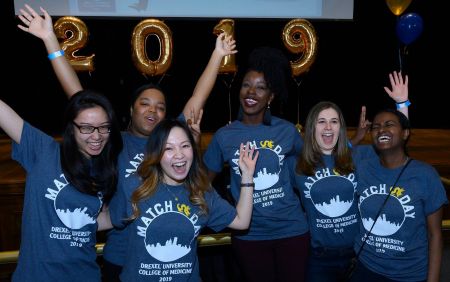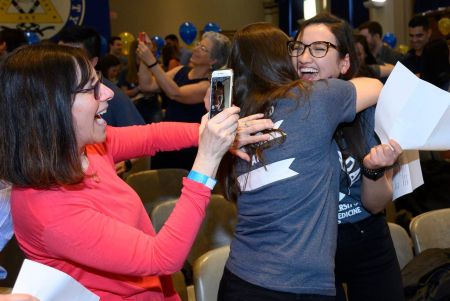Fourth-Year Medical Students Meet Their Match
March 18, 2019

On Friday, March 15, the sense of nervousness, excitement and anticipation was palpable in the Drexel University Main Building Auditorium where fourth-year medical students had gathered with friends, family and College of Medicine faculty and staff to learn where they would be spending the next three to seven years of their lives.
Known as Match Day, the annual event takes place at noon, when thousands of medical students across the country open white envelopes to learn where they will do their residency training. Following a countdown, the auditorium erupted as people high-fived, hugged and cried.
View photos from Match Day
After completing a lengthy interview process, graduating medical students submit a list of programs where they wish to train, ranked in order of preference, to the National Resident Matching Program (NRMP). Program directors also submit a list of applicants whom they have interviewed and wish to train, in order of preference. Based on these combined preferences, the NRMP uses an algorithm to determine match outcomes.
Max Brodsky, who matched in internal medicine at Johns Hopkins Hospital, had trouble sleeping the night before and took the opportunity for an early morning run to the Philadelphia Art Museum’s “Rocky” steps for inspiration. Opening his envelope was “such an overwhelming wave of emotions,” he said. “I didn't expect to cry, but I definitely broke down when I saw where I had matched. I thought about all of the things I had done to get in this position and all the people who had helped guide me to this achievement.”
Brodsky celebrated the moment with his father, who he said seemed more nervous than he was. After the excitement, Brodsky has turned his attention to what’s next. “I'm excited for the opportunity to go back home and serve the community of Baltimore. I know next year is going to bring new challenges and opportunities. My mindset is to embrace everything that lies ahead and to learn as much as possible.”

Sarah Nyirjesy, whose father Paul Nyirjesy, MD, is a Drexel University College of Medicine professor of obstetrics and gynecology, also had trouble with sleep the night before. After having a nightmare about her match, she was overjoyed to open her envelope to see she had matched at Ohio State University Wexner Medical Center in otolaryngology.
She’s looking forward to her residency, but also took a moment to reflect on her time at Drexel. “I don’t know of any other institution that provides such a high-quality education preclinically and clinically that also focuses so much on all of the other social determinants of health, and teaches you how to exercise strong morals as a person.”
Joy Fatunbi, who is the first doctor in her family, also reflected on her time at Drexel, which she admitted has been a roller coaster ride emotionally. “I have met amazing people and some lifelong friends. I have been inspired by patients and fallen in love with medicine, but I have also shed a lot of tears along the way,” she said. “The many challenges that I have faced during medical school have taught me a lot and culminated in making me extremely grateful for the opportunity to be a student here.”
Fatunbi matched with Drexel University College of Medicine/Hahnemann University Hospital in obstetrics and gynecology. “When I opened my envelope, I initially felt overwhelmed because that paper signified that I had really matched, and I would be training in the field of obstetrics and gynecology in just a few months. I feel extremely honored and privileged to be able to train in a field that helps bring families to life and advocates for women.”
Prior to the opening of the envelopes, Dr. Valerie Weber, the Deborah J. Tuttle, MD and John P. Piper, MD Vice Dean for Educational Affairs, Dr. Daniel V. Schidlow, the Walter H. and Leonore Annenberg Dean and Senior Vice President of Medical Affairs, and Drexel University President John Fry offered words of advice and congratulations to the students. They each expressed nervousness on behalf of the students, and encouragement. Dean Schidlow said, “More important than where you go is what you do when you get there.”
In all, 242 College of Medicine students matched with residency programs, 79 of them with Pennsylvania hospitals. Thirty-six students will be going to New York, 26 to California, 21 to New Jersey, 13 to Massachusetts, and 8 each to Washington, D.C., and Texas, among other places.
Internal medicine was the most popular field, with 62 students matching for their residency. Twenty-eight students will go into pediatrics; 22 into anesthesiology; 18 into obstetrics/gynecology; 16 each into general surgery and emergency medicine; 15 into family medicine; 8 each into orthopaedic surgery and psychiatry; 7 into radiology; 5 into neurology; 4 each into ophthalmology and urology; and 3 each into physical medicine and rehabilitation, otolaryngology and interventional radiology.